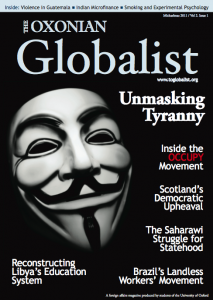
This past year, a clarion call of defiance echoed from the crumbling palaces in Tripoli to the occupied streets of New York City. Sparked by the self-immolation of a disgruntled market worker, protests in Tunisia ignited a wider movement for political change that spread across a region shackled by censorship and government control. In cities scattered across the world, stagnant economic conditions prompted millions to converge on public spaces in a plight to stem the tide of rising inequality. Elsewhere, local and national struggles, bereft of global media coverage and widespread fanfare, gained momentum.
Against this backdrop, this issue of The Oxonian Globalist presents a snapshot of various communities engaged in struggles against tyranny. In 2011, the Occupy Wall Street movement gained an unprecedented global following, yet failed to articulate a coherent vision for an alternative to the status quo. In Brazil, leaders of the mass movement comprised of agricultural workers assumed great personal risks in their campaign to attain a fairer distribution of land.
Some barriers obstructing the road to statehood were overcome by both Scottish nationalists and the stateless Sahrawi people. If successful, leaders will face a myriad of challenges in their plight to design efficient government structures, attested by public servants charged with crafting education policy in the wake of the Libyan insurrection.
Other articles in this issue confront the nexus between Christianity and homophobia in Africa, the pernicious effect of no-smoking signs, the growing influence of Esperanto, and education policy in Singapore.
We hope you enjoy this issue. If you have any thoughts or comments, please e-mail [email protected]
Thank you for your continued support,

Stephen Wan, Managing Editor (Print Edition)
Mark Longhurst, Editor-in-Chief




